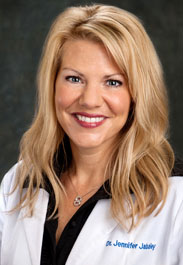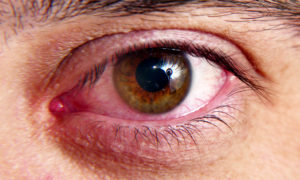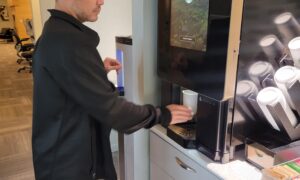By Jennifer Jabaley, OD
May 6, 2015
I transitionedfrom a suburban to a small-town practice, and that’sa big change. itincludes a new way of interacting with patients, whom you may see at the grocery store or in line to pick up your dry cleaning. However, once the necessary adjustments are made, the small-town environment offers a rewardingway of practicing.
After graduating from optometry school, I joined a large, multi-doctor suburban practice. A few years later, after marrying, I moved 60 miles north to my husband’s small hometown. My husband, also an optometrist, practiced with his father. My long-term career goal was to continue practicing part-time at the suburban practice I started with until my children were in school, my father-in-law retired and I could join my husband.
Over the last decade, I prided myself on establishing a long roster of patients that faithfully requested to see me–sometimes waiting weeks to get an appointment since I only worked one day a week. I dutifully took notes on patients’ families (patient has a daughter at UGA; patient loves to read thrillers; patient is taking painting classes) to maintain a sense of friendship within our doctor-patient relationship.
Last spring, after 13 years at the same suburban office, I said a tearful goodbye to the staff that had become like family and joined my husband in practice. I assumed the transition would require some small adjustments–different equipment and office layout to get accustomed to, a new set of ophthalmologists to establish relationships with and refer to, a staff that I previously only interacted with socially to now work with professionally. What I never really considered, however, was the patients. Because patient needs and relationships were all the same, right?
No. I soon found out that working in a small-town office, situated next door to the elementary school where my children attend, located less than two miles from my home, definitely lent itself to patient encounters that I had never experienced before. I now bump into patients at the grocery store. When I see a patient lift up their glasses to examine the price of a roast, I find myself wondering if I gave them a strong enough bifocal add. When I have to dig a slice of pencil lead out of a nine-year-old girl’s cornea, I recognize that she sits across from my son in homeroom, and I know I better use an extra delicate hand or she might scream when she sees me at the next school holiday party.
It’s common for patients to track me down outside the office with questions. I received a Facebook message from a new progressive wearer asking if it was normal to feel dizzy. I got a text message from a patient asking if allergies could make her contact lenses fog. I had a long text message conversation about a patient’s computer vision syndrome. A patient with sudden onset double vision sent me a text before calling the office. I had a voice mail message on my home phone from a friend who saw a weird white star in her vision and wondered if it was serious, or if she just stayed in her yoga inversion too long.
I no longer have a simple, one-sentence note about my patients’ interests. My patients are people I play tennis with, serve on school advisory boards with, people whose children play soccer with my kids, and whom I see every single week.
Suddenly, the stakes seem so much higher. I’ve lost sleep at night worried about patients–some with serious medical conditions, others just simple changes I hope they embrace. Working within the small town in which I live is an entirely different experience than working in a somewhat anonymous, large-volume, transient community practice. Now my patients know my children’s names. They ask about my mother-in-law’s current remodeling project. They tease me about driving past my crazy dogs running wild in my yard.
Practicing in these transparent conditions, where my life is so entwined with my patients’, causes the stakes to be elevated. But I realize that with the added pressure comes an added reward, as is true for most things in life. Now I don’t have a one-little sentence glimpse into my patients’ lives (taking piano lessons; likes to hunt), but an in-depth view into their day-to-day world. I see them in their environments. I know the dark, curvy roads they drive at night. I see if the add is working for the fine print on the price tags at the grocery store. I see them in their boat, out on the lake, and know I need to talk about Polaroid sunglasses. I notice the dry air inside the schools, know I need to talk about artificial tears and lubricants with the teachers.
A simple location change, yet now I’m more aware. I’m more invested. I feel like a better doctor.
Do you, or have you, ever practiced in a small town? What are the unique challenges of the small-town environment? By contrast, what are the challenges of a larger town or city practice?
Jennifer Jabaley, OD, is a partner with Jabaley Eye Care in Blue Ridge, Ga. To contact her: jabaleyjennifer@yahoo.com

























